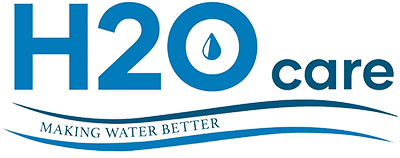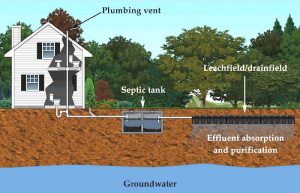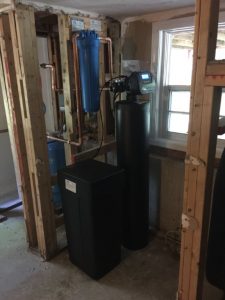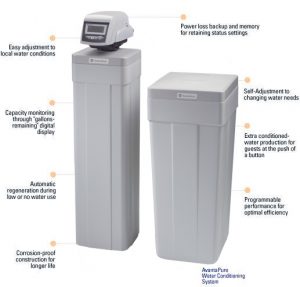WATER SOFTENERS USE WITH SEPTIC SYSTEMS?
Studies on the relationship between a water softener and septic system extend back to the 1970’s, through organizations such as the Water Quality Association (WQA) and Small Scale Waste Management Project (SSWMP) at the University of Wisconsin. Research shows that not only do efficient, well operating water softeners have no negative effect on septic systems, but water softeners actually have potential to aid the process.
Workings of a Septic System
Understanding the components of a septic system is helpful in order to understand any potential effects water softeners can have on it. A conventional septic system consists of a septic tank, a distribution box, and a drain field, all connected by pipes. Wastewater travels through pipes from the home to the septic tank where the solids (sludge) go to the bottom of the tank and lighter material float to the top (scum layer). During the septic treatment process, both layers are partially decomposed with the help of bacteria that naturally occurs in human waste. The septic tank discharges water into a drain field as more wastewater is released from the home.
How water softeners works
Water softeners remove hard minerals from your water that may be causing scale build-up inside your plumbing distribution system, hot water heating systems corrossion, dry hair and skin, staining of laundry, streaking and spotting on glassware and other build-up and staining on fixtures. Most water softeners contain a media tank, and the brine tank. The media tank holds the resin that removes hardness minerals enabling soft water to be distributed throughout the home. The water softener’s brine tank stores salt and will add water as needed to dissolve the salt into the brine solution. The brine (salt water) is used to clean the resin, knocking off the hardness minerals it gathered and sending them to the drain, so the unit is ready to remove more minerals.
How water softeners aids septic systems
One myth associated with a water softener and a septic system is that the sodium in softened waste reduces the effectiveness of the bacteria your septic system needs. Studies conducted by the University of Wisconsin have found this to be untrue. The University found that soft water can increase the biological performance in the septic tank. The right amount of sodium in the soft water aids bacterial growth, optimizing the septic treatment process. Another bonus to having soft water is that it reduces the amount of detergents and soaps needed to clean well. By using lesser amounts of cleaning supplies there is even less to worry about when it to comes to the effect these chemicals can have on your septic system.
Why efficient water softeners do not disrupt septic systems
The small amount of wastewater produced by the regeneration process, discharged to your septic tank is sometimes misconceived as disruptive. One concern with water softeners and septic systems is that the amount and flow rate of the brine discharge can overflow a septic tank and back up the drain field. A study commissioned in 2012 by the Water Quality Research Foundation reported that brine discharge from well operated water softeners (50 gallons per regeneration or less) showed no overflow. The discharge was no more or less than that of any other household water using appliance.
Importance of a high performance water softener
It is important to understand how the quality of a water softener can influence a septic system. The discussion of a water softener and a septic system is on-going in part due to extremely inefficient softeners that remain in use. Poorly operating water softeners can produce too much brine waste while regenerating more than necessary, which in some cases may cause problems to arise with older septic systems. If the water softener is releasing too much salt and water, this could have a negative effect on your septic system’s function. That’s why it is so important to have a properly operating and efficient water softener system in any home.
H2O Care, Inc. is an established, regional water testing and filtration service organization, started in 1989. Offices are located in Middleton and Hudson, Massachusetts with a service depot in Plymouth, MA. Our published articles can be seen by linking into our publications section of our website at the link: Publications. We can be reached by email at [email protected] or by calling us at 800-539-1100.




